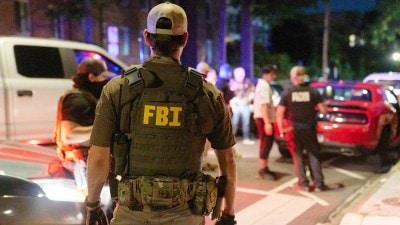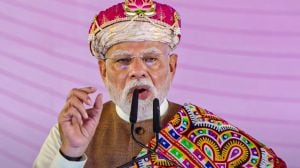Even off field, Desailly is all fluent and grace
After the relative silence of the past couple of days — Koreans are not the most loquacious of people — the press conference at th...

After the relative silence of the past couple of days — Koreans are not the most loquacious of people — the press conference at the French training camp at the LG Stadium in Seoul was refreshing.
No matter that half of it was in French, a language known to this writer only through the lyrics of ‘‘Michelle’’ and other such efforts at social climbing. (Happily, French coach Roger Lemerre’s diktat it didn’t leave just Indians out in the cold; there were quite a few Brits miffed by the reversal in the language game.)
What was interesting to see was the ease with which Marcel Desailly, ‘The Rock’ of Adidas ad fame and captain of the current French side, handled the media. He is, of course, a veteran; at 34, there isn’t much left for him to play for. But he comes across as the consummate modern professional, handling awkward questions with maturity and humour.
He spoke in French, of course, but also in English, the language of the country where he plies his trade, and — with remarkable ease and fluency — Italian, where he spent several successful years with AC Milan.
Tactical leadership
Desailly is the centre of what is being seen as an ageing defence, one whose solidity is also undermined by an erratic, eccentric goalkeeper, Manchester United’s Fabien Barthez. His teammates will also look to him for the tactical leadership that usually springs from the mind of one M. Zidane (who was not present at the training session that followed the press meet).
Desailly was asked this, in fact, today but he sidestepped it with a typically Gallic shrug of the shoulders: ‘‘We all have to share the burden in Zizou’s absence, we all know what’s expected in each one of us.’’
Holders’ jinx
There is in the French a growing awareness that they may just fall prey to the Holders’ Jinx: that previous winners usually lose the opening match of the new tournament. And the fact that Senegal comprise almost entirely players from the French league — and are coached by a Frenchman, the charismatic Bruno Metsu — won’t help much. This is the beauty of the World Cup: that a Tunisia, a China, a Turkey may just upset a favourite team and ruin the fortunes of a million bookmakers.
Global phenomena
To see how global the game has got, one need look no farther than the media centre. There are journalists from everywhere; from Senegal and Nigeria, of course, but also from Ecuador, Bangladesh, Greece.
They tend to move in packs; those who’ve been there, done that staying aloof; the eager beavers, the first-timers, finding it hard to resist asking Desailly for his autograph. Some would even be happy with that of Martin Tyler, the Sky TV commentator who brings football in India’s living rooms August to May. All part of the footballing fraternity.
A great leveller
At the media centre, the fraternity is divided not according to nationalities but by something far more rudimentary: those who have laptops and those who don’t. There are just 10 Internet connections in this, the main media centre in Korea, so opportunities to surf the net — or indeed, to file stories — are hard to come by.
So the Internet corner is the great leveller, and also a good place for making friends.
Worth the trouble
Tonight, as a light rain falls across the city, bringing the temperature down several degrees and probably making the Fevernova ball that much more difficult to play with, Seoul celebrates World Cup Eve.
In parks, shopping malls, down by the Han River, up in Guri city where the French are based, there’s an edge to the waiting.
This isn’t just another moment in the countdown; this is IT. The city wakes up tomorrow knowing the eyes of the world are on it. There will be heavy security — this reporter saw two truckloads of army commandoes on the way to Guri — which will cause more than a little irritation.
But if this month can pass by without any major calamity, it will all be worth it. even though my camera reel is half-full of grey stone pictures.
Photos


- 01
- 02
- 03
- 04
- 05





























